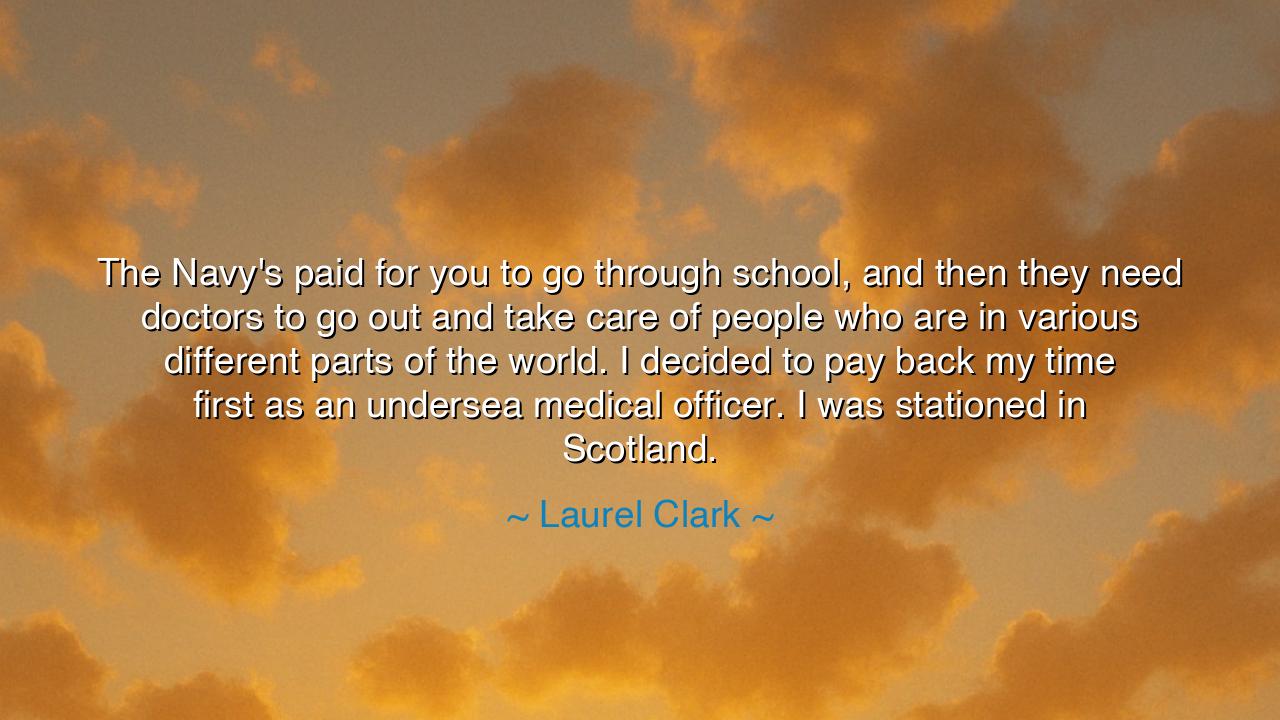
The Navy's paid for you to go through school, and then they need
The Navy's paid for you to go through school, and then they need doctors to go out and take care of people who are in various different parts of the world. I decided to pay back my time first as an undersea medical officer. I was stationed in Scotland.






Hearken to the words of Laurel Clark, whose reflection unveils a timeless truth about duty, gratitude, and service. She observes that the Navy’s paid for you to go through school, yet expects its physicians to give back their knowledge and skill to heal the sick and protect the living across the globe. In her words lies a principle as ancient as civilization itself: privilege carries responsibility, and the gifts of education and opportunity are intertwined with a sacred duty to others.
Since the earliest days of organized society, those who were trained in healing or skill were bound by an ethical covenant to serve. In ancient Greece, physicians were educated in temples of Asclepius, yet their training was not for personal gain alone; Hippocratic physicians understood that knowledge was a debt owed to the community, a trust to be exercised in alleviating suffering. Clark’s words echo this ancient understanding: education and opportunity are inseparable from obligation, and service is the measure of both wisdom and character.
Consider the story of Galen, the famed physician of Rome, who studied extensively under teachers of his era yet dedicated his skill to caring for soldiers, emperors, and the sick alike. Though he could have pursued fame or personal wealth, Galen honored the expectation that knowledge should be applied where it is most needed. Similarly, Clark chose to pay back her time first as an undersea medical officer, demonstrating a recognition that her gifts were to be exercised in service, not solely for personal advancement.
Clark’s reflection also emphasizes the reach and impact of duty. She was stationed in Scotland, far from home, serving in a capacity that required courage, skill, and adaptability. Like the physicians, healers, and scholars of old, she ventured into unfamiliar realms to apply her expertise where it was demanded. This illustrates an eternal principle: true service often requires leaving comfort and familiarity behind, bringing knowledge to the places and people most in need.
The narrative speaks not only to personal responsibility but also to the ethics of reciprocity. When a society or institution invests in an individual—through education, opportunity, or mentorship—there is a tacit expectation that the individual will return value in kind, not for self-aggrandizement but for the good of the larger community. Clark embodies this ethic, reminding us that gratitude is expressed through action, not words alone.
In modern terms, this principle transcends military service. Every profession, from medicine to law to education, carries implicit obligations to serve the public good. The lesson of Clark’s words is universal: receive with humility, and repay with dedication. Knowledge, skill, and opportunity are treasures whose value is realized only when applied to the benefit of others.
Practical guidance emerges: when gifted with education, training, or opportunity, seek ways to serve beyond self-interest. Commit time and effort to those who depend upon your skills, whether in distant lands or within your own community. Recognize that true mastery is not measured by accolades, but by the lives touched and the burdens eased through dedicated service.
Thus, heed the wisdom of Laurel Clark: honor the debt of opportunity by embracing duty, courage, and service. Let your skills and knowledge flow outward, as she did, to meet the needs of others across the world. In this act of giving, we not only repay our debts but affirm the highest ideals of humanity, transforming privilege into purpose and opportunity into enduring good.






AAdministratorAdministrator
Welcome, honored guests. Please leave a comment, we will respond soon